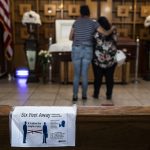Originally published on Medscape, on September 24, 2020
I am a family physician. If I withheld critical information from my patients, I would be sued for malpractice and stripped of my medical license.
But that’s what the president did. He withheld information critical to the nation’s health. To me, that’s leadership malpractice.
Revelations, including audio recordings, from Bob Woodward’s new book Rage have made it clear that the president knew coronavirus was deadly serious. In his own words, President Trump states that he misled the American public so as to “not create a panic.”
“I always like to play it down,” he said.
When I heard the tapes, I thought about the many conversations I’ve had over the years with patients who have faced daunting health challenges.
If my patient tested positive for HIV, would I hide the news to “not create a panic”? Having such information can both empower the patient and protect others.
If I ran diagnostics for a patient that revealed an imminent medical crisis, would I minimize that danger when speaking with my patient?
No. Of course not. I would be imperiling that patient’s life and flagrantly violating the health professional’s foundational principle of “do no harm.” The consequences for my patients would be grave, and my professional career would be over. No hospital or clinic in the country would hire me if I acted so recklessly with these life-and-death issues.
The consequences of the president’s behavior have been catastrophic. Over 200,000 of our relatives, friends, and neighbors are dead.
As President Trump now explains his actions, he presents his decision as a binary choice between “creating a panic” and telling hard truths.
All health professionals, and most human beings, know that you can best deliver difficult news by communicating promptly, accurately, and empathetically. Sharing this type of information with your patient — or with the public, in Trump’s case — is not only the responsible thing to do, it’s an ethical imperative.
As Kristin Urquiza, a woman whose father died from COVID-19, put it, “Sure, my dad did not panic. Instead, he died.”
Doctors, nurses, and health workers are trusted to deliver tough news and act decisively to protect health. We should expect the same from policymakers.
The consequences of the president’s behavior have been catastrophic. Over 200,000 of our relatives, friends, and neighbors are dead. Millions of jobs lost and an economy in crisis. First days of school taking place in the living room in front of a laptop screen.
As a physician and as a human being, I demand that those who are elected to keep the country safe deliver the hard news and act to save lives.
My medical advice includes:
- Enacting a national mask mandate with teeth, which will save lives
- Dramatically expanding rapid COVID-19 testing and processing, which will help us track cases and their contacts and to safely reopen essential services
- Providing health and essential workers with the resources and protective equipment they need to do their jobs safely, which will benefit all of us
- Prioritizing the opening of schools and health facilities over bars and football games, which will help to keep our kids and teachers safe
- Creating a 9/11-style “COVID Commission” to independently investigate the United States’ response to COVID, catalogue everything that’s gone wrong, expose its root causes, trace responsibility, and better prepare for the next inevitable pandemic
The United States just marked a grim milestone. We owe it to the 200,000 of our patients who have died from COVID-19 and their surviving families, caretakers, and communities to not “play it down.”

